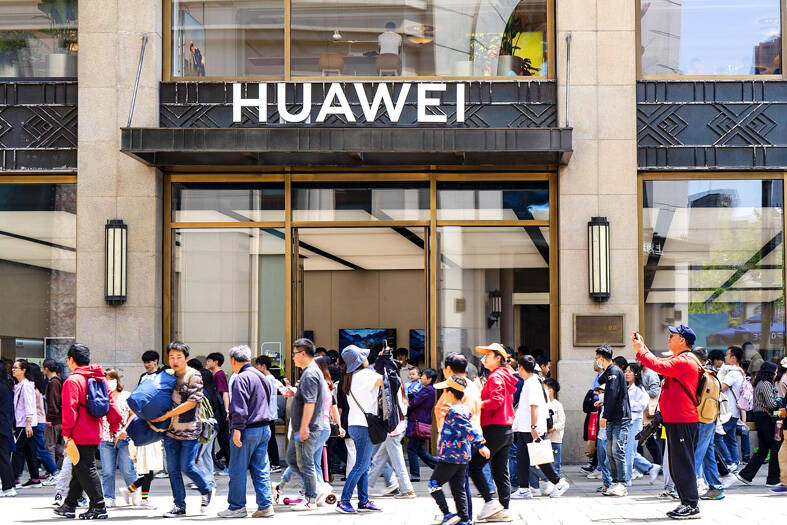Huawei Technologies Co (華為) is close to finishing the construction of a semiconductor research and development (R&D) center in Shanghai, in a move that is likely to advance China’s technological ambitions even as the US tries to halt its rise.
The park, which would be Huawei’s largest research center globally, is to house about 30,000 personnel, statements on the Shanghai government’s Web site says.
The site in Qingpu District covers 1.6 million square meters and has its own road network, a small railway system and elevated bridges which are already in place, the release said.

Photo: Bloomberg
The new facility would pursue breakthroughs in semiconductors for devices, wireless networks and the Internet of Things, said a state media report in January, citing a Shanghai government briefing.
The total investment cost is 10 billion yuan (US$1.4 billion), a statement posted on the Qingpu government’s Web site says.
Huawei has been a target of US sanctions and export controls for years, as Washington and Beijing vie for supremacy in the semiconductor sector.
Last year, the company successfully navigated US restrictions to launch a new 5G phone, which was powered by an advanced made-in-China 7-nanometer chip.
US President Joe Biden’s administration has since initiated further curbs to rein in Huawei’s chip progress, including asking its allies to add new restrictions on China’s semiconductor sector.
It also revoked licenses that allowed Huawei to buy some chips from Qualcomm Inc and Intel Corp in an effort to plug any loopholes in existing conditions.
Industry participants are likely to scrutinize Huawei’s next flagship smartphone, the Mate 70, which is expected later this year, for any signs that Beijing has made further strides in semiconductor development.
Its predecessor, the Mate 60, garnered strong demand from local consumers and helped Huawei gain some market share at the expense of competitors, including Apple Inc.

Intel Corp chief executive officer Lip-Bu Tan (陳立武) is expected to meet with Taiwanese suppliers next month in conjunction with the opening of the Computex Taipei trade show, supply chain sources said on Monday. The visit, the first for Tan to Taiwan since assuming his new post last month, would be aimed at enhancing Intel’s ties with suppliers in Taiwan as he attempts to help turn around the struggling US chipmaker, the sources said. Tan is to hold a banquet to celebrate Intel’s 40-year presence in Taiwan before Computex opens on May 20 and invite dozens of Taiwanese suppliers to exchange views

Application-specific integrated circuit designer Faraday Technology Corp (智原) yesterday said that although revenue this quarter would decline 30 percent from last quarter, it retained its full-year forecast of revenue growth of 100 percent. The company attributed the quarterly drop to a slowdown in customers’ production of chips using Faraday’s advanced packaging technology. The company is still confident about its revenue growth this year, given its strong “design-win” — or the projects it won to help customers design their chips, Faraday president Steve Wang (王國雍) told an online earnings conference. “The design-win this year is better than we expected. We believe we will win

Chizuko Kimura has become the first female sushi chef in the world to win a Michelin star, fulfilling a promise she made to her dying husband to continue his legacy. The 54-year-old Japanese chef regained the Michelin star her late husband, Shunei Kimura, won three years ago for their Sushi Shunei restaurant in Paris. For Shunei Kimura, the star was a dream come true. However, the joy was short-lived. He died from cancer just three months later in June 2022. He was 65. The following year, the restaurant in the heart of Montmartre lost its star rating. Chizuko Kimura insisted that the new star is still down

While China’s leaders use their economic and political might to fight US President Donald Trump’s trade war “to the end,” its army of social media soldiers are embarking on a more humorous campaign online. Trump’s tariff blitz has seen Washington and Beijing impose eye-watering duties on imports from the other, fanning a standoff between the economic superpowers that has sparked global recession fears and sent markets into a tailspin. Trump says his policy is a response to years of being “ripped off” by other countries and aims to bring manufacturing to the US, forcing companies to employ US workers. However, China’s online warriors